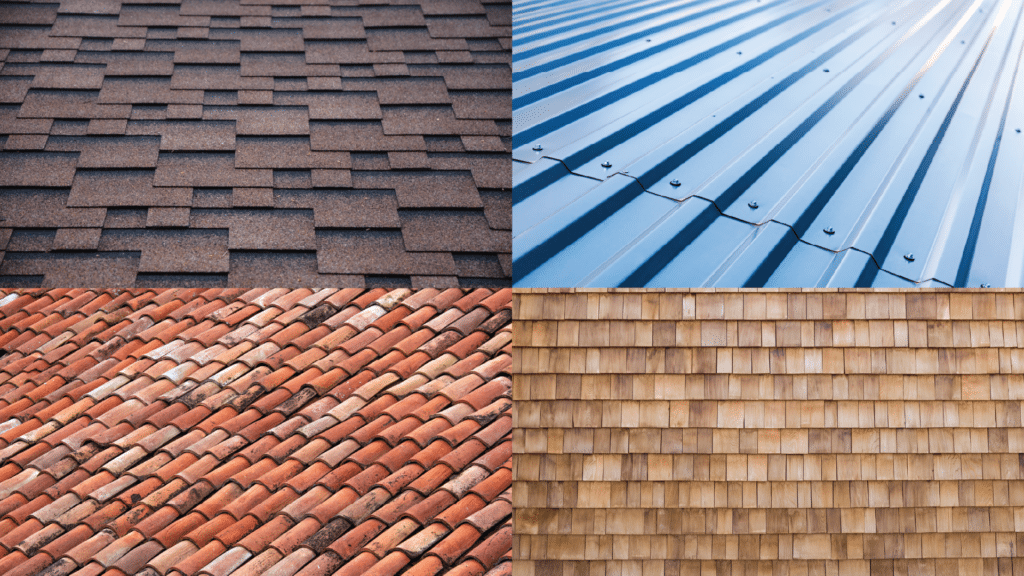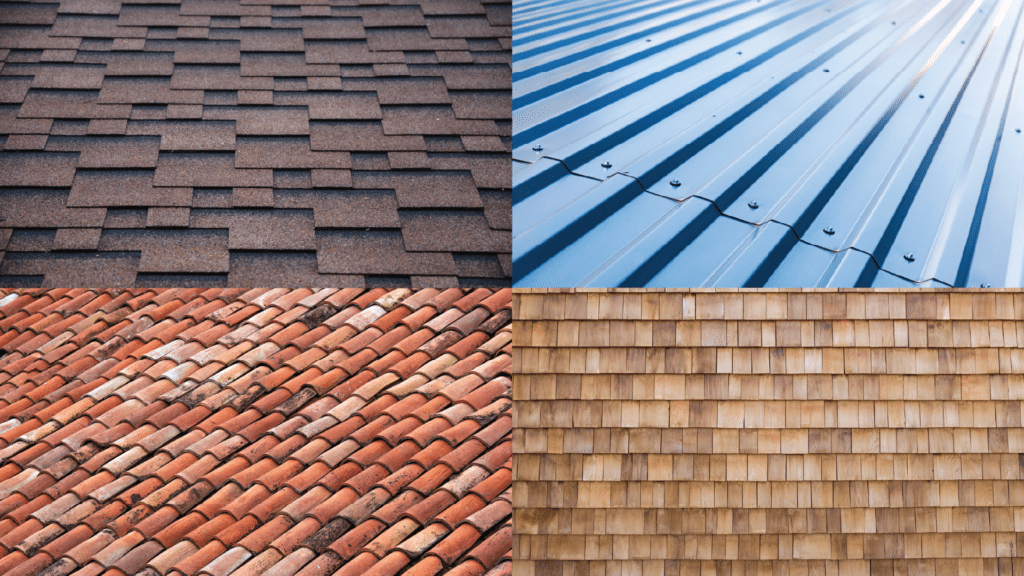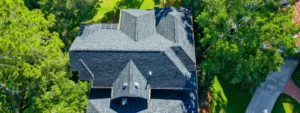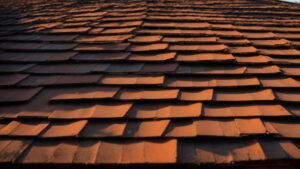Choosing the right roofing material for your Florida home is a crucial decision.
The lifespan of your roof can significantly impact your home’s value and your overall maintenance costs.
In Florida, the choice of roofing material is even more critical. The state’s unique climate, characterized by high heat, humidity, and the potential for severe weather, can significantly affect the longevity of your roof.
This guide aims to provide comprehensive information on the lifespan of various roofing materials in Florida. It will help homeowners, property managers, and construction professionals make informed decisions when selecting roofing materials suitable for Florida’s unique climate.
From asphalt shingles to metal roofing, we’ll explore how each material fares in the Sunshine State.

Florida’s Unique Climate and Its Impact on Roofing
Florida’s climate is a significant factor in determining the lifespan of roofing materials. The state’s high temperatures, humidity, and potential for severe weather can all affect a roof’s longevity.
For instance, the intense heat and sun exposure can cause roofing materials to degrade faster. Similarly, the high humidity and frequent storms can lead to moisture damage and wind damage.
Moreover, homes near the coast may face additional challenges due to saltwater corrosion.
High Heat and Sun Exposure
Florida is known for its high temperatures and intense sun exposure. These conditions can cause roofing materials to age and degrade faster.
For example, asphalt shingles may become brittle and lose their protective granules, reducing their lifespan.
Humidity, Rain, and Storms
Florida’s high humidity and frequent rainstorms can also impact the lifespan of roofing materials. Moisture can lead to mold and mildew growth, especially on wood shingles and shakes.
Additionally, Florida’s hurricane season can cause significant wind damage to roofs, leading to a need for repairs or replacement.
Saltwater Corrosion
For homes near the coast, saltwater corrosion is another factor to consider. Saltwater can accelerate the corrosion of certain roofing materials, such as metal.
However, some materials, like tile and slate, are more resistant to saltwater corrosion, making them a good choice for coastal homes.
Common Roofing Materials in Florida and Their Lifespans
In Florida, homeowners have a variety of roofing materials to choose from. Each material has its own set of advantages and disadvantages, and their lifespans can vary significantly.
It’s important to understand the expected lifespan of each material in Florida’s unique climate. This knowledge can help homeowners make an informed decision when selecting a roofing material.
Asphalt Shingles
Asphalt shingles are a common choice for Florida homes. They are affordable and come in a variety of colors and styles.
However, the lifespan of asphalt shingles in Florida is typically around 15-20 years. This is due to the state’s high heat and potential for severe weather, which can cause the shingles to degrade faster.
Metal Roofing
Metal roofing is known for its durability and longevity. In Florida, a metal roof can last up to 40-70 years with proper maintenance.
Metal roofs are resistant to wind, fire, and rot. This makes them a suitable option for Florida’s climate, especially in areas prone to hurricanes.
Tile Roofing: Clay and Concrete
Tile roofing, including clay and concrete tiles, is another popular choice in Florida. These materials can last over 50 years with proper maintenance.
Tile roofs offer excellent resistance to heat and are ideal for reflecting sunlight. This can help reduce cooling costs, a significant benefit in Florida’s hot climate.

Slate Roofing
Slate roofing is less common in Florida, but it offers exceptional longevity. A slate roof can last over 100 years if installed correctly.
However, the weight of slate roofing may require additional structural support. This is an important consideration for Florida homes, especially those in areas prone to hurricanes.
Wood Shingles and Shakes
Wood shingles or shakes are not typically recommended for Florida homes. They are susceptible to moisture and termites, common issues in Florida’s humid climate.
With diligent maintenance, the lifespan of wood roofing in Florida is generally around 15-25 years. However, this can vary depending on the specific type of wood used and the quality of the installation.
Flat Roof Systems
Flat roofs are often used on commercial properties in Florida. The lifespan of these roofs can vary depending on the material used.
For example, built-up roofing (BUR) can last around 15-30 years, while TPO and EPDM roofs can last up to 20-30 years. Regular inspections and maintenance are crucial for maximizing the lifespan of a flat roof.
Factors Influencing Roof Longevity in Florida
Several factors can influence the lifespan of roofing materials in Florida. These include the quality of installation, regular maintenance, and adherence to building codes and regulations.
The climate and weather conditions in Florida also play a significant role. High heat, humidity, and severe weather can all impact the longevity of a roof.
Installation and Workmanship
The quality of installation is a crucial factor in the lifespan of a roof. A poorly installed roof may not last as long, regardless of the material used.
The expertise of the roofing contractor also plays a significant role. A skilled contractor will ensure that the roof is installed correctly, which can extend its lifespan.
Maintenance and Repairs
Regular maintenance and timely repairs are essential for maximizing the lifespan of a roof. This includes regular inspections to identify and fix any potential issues before they cause significant damage.
In Florida’s harsh climate, neglecting maintenance can lead to a shorter lifespan for the roof. Therefore, homeowners should prioritize regular roof check-ups and maintenance.
Building Codes and Regulations
Adherence to local building codes and regulations is another important factor. These codes are designed to ensure that roofs can withstand Florida’s unique climate and weather conditions.
For example, roofs in Florida must meet certain standards for wind and impact resistance. Failing to meet these standards can result in a shorter lifespan for the roof.
Enhancing Roof Longevity: Tips and Best Practices
To enhance the longevity of your roof in Florida, there are several best practices to follow. These include regular inspections and maintenance, choosing the right material for your location, and implementing upgrades and protective measures.
By following these tips, you can ensure that your roof lasts as long as possible, saving you money and hassle in the long run.
Regular Inspections and Maintenance
Regular inspections are crucial for identifying potential issues before they become major problems. By catching and addressing these issues early, you can extend the lifespan of your roof.
In addition to inspections, regular maintenance is also important. This includes cleaning the roof, checking for damage after storms, and making necessary repairs promptly.
Choosing the Right Material for Your Location
The type of roofing material you choose can significantly impact its lifespan. Some materials are better suited to Florida’s climate and weather conditions than others.
For example, metal and tile roofs are known for their durability and resistance to Florida’s high heat and severe weather. On the other hand, wood shingles may not last as long due to their susceptibility to moisture and termites.
Upgrades and Protective Measures
Implementing upgrades and protective measures can also enhance the longevity of your roof. This includes things like adding hurricane straps and clips to improve wind resistance, or applying a reflective coating to reduce heat absorption.
In addition, proper attic ventilation and insulation can prevent heat buildup and moisture accumulation, further extending the lifespan of your roof.
Conclusion: Making an Informed Decision for Your Florida Roof
Choosing the right roofing material for your Florida home is a significant decision. It requires careful consideration of various factors, including the material’s lifespan, cost, and suitability for Florida’s unique climate.
By understanding the lifespan of different roofing materials and the factors that influence it, you can make an informed decision that best suits your needs and budget.
Summary of Roofing Materials Lifespan
In summary, the lifespan of roofing materials in Florida varies widely. Asphalt shingles typically last 15-20 years, while metal and tile roofs can last up to 70 and 50 years, respectively. Slate roofing, though less common, can last over 100 years with proper installation and maintenance. For more information, visit AJ Wells Roofing or call us at 904-553-0069.
Final Checklist for Homeowners
Before making a decision, here’s a final checklist for homeowners:
- Consider the lifespan of the roofing material.
- Evaluate its suitability for Florida’s climate.
- Factor in the cost, including installation and maintenance.
- Check if it meets local building codes and regulations.
- Consider the potential impact on your home insurance premiums.
- Think about the material’s environmental impact and recyclability.




